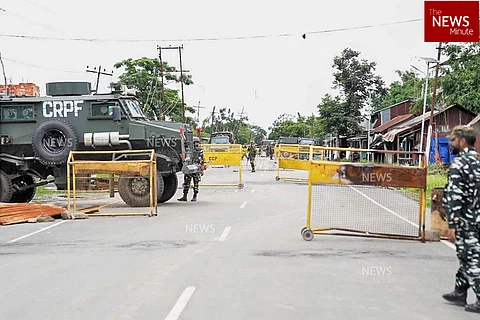

On May 4, the body of Paolalmoun Haokip, a labourer, arrived at the morgue of Imphal's Regional Institute of Medical Sciences (RIMS). The 19-year-old Kuki teenager from Thenzol village in Churachandpur district of Manipur had succumbed to injuries he sustained when he was trying to flee the state capital Imphal during the ethnic clashes that broke out between the Meitei and Kuki communities on May 3 this year. His corpse now lies among 57 bodies that have not been claimed from the morgues of government hospitals in the state.
TNM found that three government hospitals in the state have recorded 150 deaths in connection with the clashes since May 3. Of these, 57 bodies have not been claimed, and 30 bodies are yet to be identified by the state government. All the unidentified bodies are victims from the Kuki community currently in hospitals in Imphal, the state’s administrative centre.
Even though many of these deaths occurred in the first week of May during the early phase of the violence, more than three months later, the bodies are still at the morgue as the Meitei-majority valley areas have turned into no-go zones for Kukis who live in the hills – and vice versa. "Almost all lines of contact have snapped," says Mary Neimneikim, Paolalmoun’s cousin. “Nothing is like it should be.” Mary’s situation is a reminder of the collective trauma that has engulfed Manipur, where several families are yet to bury their kin.
“It is a massive challenge. Family members of Kuki victims cannot cross the blockade to come to Imphal and we have not been able to arrange a way to transport the bodies,” says Dr Bapin Kumar Moiramtheng, Head of the Forensic Medicine Department at the Jawaharlal Nehru Institute of Medical Sciences (JNIMS) Hospital in Imphal East district.
The road from Imphal to Churachandpur has turned into a war zone with army and paramilitary forces separating the Meiteis settled in the valley from the Kukis residing in the hills. In addition to the forces, groups of women vigilantes belonging to the Meitei and Kuki communities are blocking the movement of civilians, police officials, and even armed forces.
Meira Paibis (torch-bearing women) blocking army personnel/By Bhuvan Malik
“In some cases, there were no ID cards to help identify these bodies. We are trying to preserve as many DNA materials as we can from these bodies,” Dr Bapin said. In the event of an unnatural death, the responsibility to identify bodies lies with the magistrate and is usually carried out by the police.
Hospital officials further said that they are running out of space to store the bodies piling up. Located in the hill areas where the Kukis dominate, the Churachandpur District Hospital’s morgue contains 38 bodies. Only four of the bodies are of Meitei community members. The remaining 34 bodies of Kukis are still in the morgue as Kuki community leaders plan to conduct a mass burial of the victims belonging to their community. “We simply do not have the space for storing so many bodies. The cold storage facility can hold 12 bodies,” Dr Tinglonglei Thangluai, Medical Superintendent of the hospital, said. The cold storage facility was full within the first three days of the conflict. As more and more bodies are coming in, the hospital is now storing bodies in the mortuary by laying them on iron stretchers on the ground.
“We are preserving the bodies with white pumpkins (a traditional practice), but now the bodies are badly decomposed and the faces are disfigured,” said Dr Tinglonglei. Using white pumpkin juice with formaldehyde to preserve bodies is a traditional practice and is commonly used in some areas of Manipur.
Echoing Dr Bapin Kumar, authorities at the RIMS said that the bodies are decaying and an immediate solution is needed. “We have only a cold storage capacity for six bodies. We have other cases too. So we have embalmed the unclaimed bodies. But it has been months, and even that has stopped working,” one of the authorities said. At JNIMS, they have transferred the bodies to coffins to control the odour. “Initially, we kept them in plastic covers after embalming and later shifted them to coffins. But that too doesn't seem to be helping, as the bodies are all almost decayed, and we have no idea how to deal with the issue,” Bapin Kumar added.
RIMS Hospital in Imphal/By Bhuvan Malik
For the families of the dead, the overburdened system has turned the act of mourning into an anxious torture. “We wanted to grieve together with other victims’ families, but we have not been able to,” said Mary Nemneikim. She says she has requested leaders of the Indigenous Tribal Leaders Forum (ITLF), a collective of Kukis, to bury her cousin with other Kuki victims of the violence. ITLF planned to conduct a mass burial of Kuki victims on August 3 but it has since been delayed with Union Home Minister Amit Shah requesting the organisation on Thursday to change the site of the mass burial.
Government hospital administrators in Imphal and Churachandpur, and groups representing Kukis and Meiteis, have requested the state government in Manipur to facilitate the passage of the victims. “Only so much can be done to preserve the body for this long. We understand that grieving and burying the dead is important to everyone irrespective of their community and we hope there is a resolution soon,” says Dr Bapin Kumar.
Manipur Dispatches: Our reporters Prajwal Bhat, Haritha John and Bhuvan Malik are in Manipur to provide you with exclusive, in-depth ground reports that delve into the heart of the matter, highlighting the real issues underlying the current conflict. If you believe that human rights violations in a distant land should be a topic of conversation in this part of India, support our intrepid truth-seeking mission. Contribute here